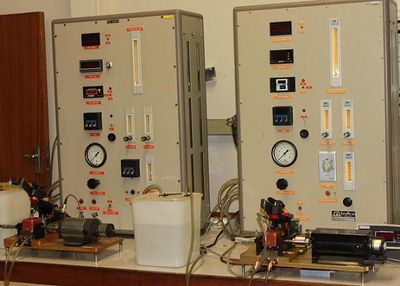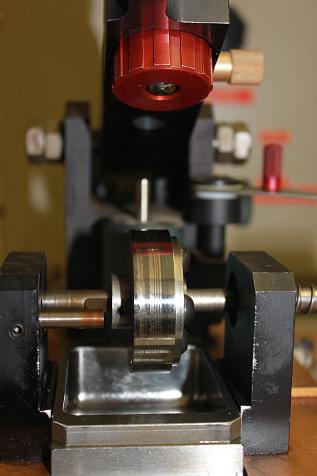Difference between revisions of "T12 & T13 Ball On Cylinder Lubricity Evaluator (BOCLE) & Scuffing Load - Ball On Cylinder Lubricity Evaluator (SL-BOCLE)"
| Line 11: | Line 11: | ||
2) The qualifying parameters and test methods (See ASTM link below).<br/> | 2) The qualifying parameters and test methods (See ASTM link below).<br/> | ||
3) The maximum load they can carry.<br/> | 3) The maximum load they can carry.<br/> | ||
| − | |||
<br/> | <br/> | ||
| Line 22: | Line 21: | ||
[[File:IMG 4440.JPG|400px|right|thumb|Ball,Ring & Bath]] | [[File:IMG 4440.JPG|400px|right|thumb|Ball,Ring & Bath]] | ||
| + | |||
In this Table some basic differences are presented: | In this Table some basic differences are presented: | ||
Revision as of 07:52, 19 November 2012
Both the Ball On Cylinder Lybricity Evaluator (BOCLE) and the Scuffing Load - Ball On Cylinder Lubricity Evaluator work on the principle of testing the lubricity of a fuel/lubricant. A non-rotating ball is forced against a rotating cylinder. The cylinder is partially immersed in a bath of the fuel to allow the fuel to be constantly carried to the area of contact.
The BOCLE & SL-BOCLE machines operate on much the same principals. They are nearly identically
constructed. They differ in:
1) The types of fuels they typically test.
2) The qualifying parameters and test methods (See ASTM link below).
3) The maximum load they can carry.
The BOCLE is a wear test. A microscope and camera is used to quatify the size and record the appearance.
The SL-BOCLE is a load carrying capacity test. A series of loads are applied until a sudden
change in the friction coefficient is observed (higher than 0.175). This load then represents
some of the lubricity behaviour.
Note the suggested loading sequence in the operating manual.
In this Table some basic differences are presented:
Both units are operated via a simulink interfaces found on the PC next to the units (Univ PC nr: 766118).
Contents
Documentation
User Manual
A single user manual exists for both machines. click here
ASTM Standards
BOCLE (ASTM D5001)
click here
SL-BOCLE (ASTM D6078)
click here
MSDS of relevant Chemicals
Acetone
click here
Isooctane
click here
Isopropyl alcohol
click here
Reference fuels (A&B)
click here
Wiring diagrams
Overall wiring diagram Media:Example.ogg
Detailed Opto wiring diagram Media:Example.ogg
Piping diagram (Air flow)
click here
History of this Equipment
The equipment was recieved from Sasol in 2012 after being used there for a period of time. The equipment was conntected to the OPTO 22 network in 2012 by Jacques Langenhoven to allow data logging and control through the lab network and OPTO system.
Current/Previous projects
2012
Jacques Langenhoven, The commissioning of the BOCLE & SL-BOCLE in the Tribology lab
Media:Example.ogg


